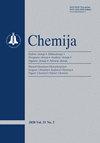Porous poly(urethane urea) microparticles for immobilization of maltogenic α amylase from Bacillus stearothermophilus
IF 0.4
4区 化学
Q4 CHEMISTRY, MULTIDISCIPLINARY
引用次数: 1
Abstract
Maltogenic α amylase from Bacillus stearothermophilus (BsMa) was immobilized by covalent attachment and physical adsorption onto porous poly(urethane urea) (PUU) microparticles obtained from poly(vinyl alcohol) (PVA) and 4,4’-methylenebis(cyclohexyl diisocyanate) (H12DI) by onepot synthesis. The influence of PUU synthesis parameters such as PVA and H12DI molar ratio, synthesis time and temperature on porosity, surface area, structure of microparticles and catalytic activity and stability of immobilized BsMa was investigated. The highest efficiency of the immobilization of BsMa onto the PUU carrier was 97% and the highest residual stability of the immobilized enzyme reached 95% after 28 days of storage at 4°C. The optimal activity temperature of immobilized BsMa was at 80°C and it was higher than that of native enzyme. Effects of ionic strength and repetitive batch processing cycles on the activity of immobilized BsMa were also studied. Immobilization of BsMa onto PUU carriers has a great potential for biotechnology and food industries.多孔聚氨基甲酸乙酯脲微颗粒固定化嗜热脂肪芽孢杆菌产麦芽α淀粉酶
以聚乙烯醇(PVA)和4,4’-亚甲基双(环己基二异氰酸酯)(H12DI)为原料,采用共价连接和物理吸附的方法,将嗜热脂肪芽孢杆菌(BsMa)产麦芽α淀粉酶固定在多孔聚氨酯脲(PUU)微粒上。研究了PVA和H12DI摩尔比、合成时间和温度等PUU合成参数对固定化BsMa的孔隙率、表面积、微粒结构以及催化活性和稳定性的影响。BsMa在PUU载体上的最高固定效率为97%,在4°C下储存28天后,固定化酶的最高残留稳定性达到95%。固定化BsMa的最适活性温度为80°C,高于天然酶。研究了离子强度和重复间歇处理周期对固定化BsMa活性的影响。BsMa在PUU载体上的固定化在生物技术和食品工业中具有巨大的潜力。
本文章由计算机程序翻译,如有差异,请以英文原文为准。
求助全文
约1分钟内获得全文
求助全文
来源期刊

Chemija
化学-化学综合
CiteScore
1.30
自引率
16.70%
发文量
14
审稿时长
>12 weeks
期刊介绍:
Chemija publishes original research articles and reviews from all branches of modern chemistry, including physical, inorganic, analytical, organic, polymer chemistry, electrochemistry, and multidisciplinary approaches.
 求助内容:
求助内容: 应助结果提醒方式:
应助结果提醒方式:


